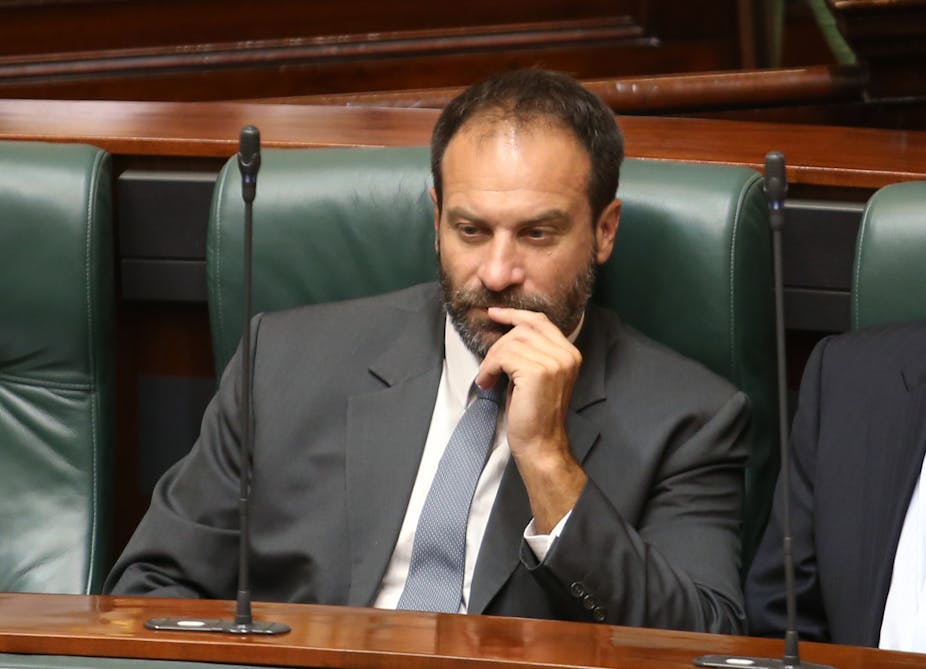The Liberals must already be relishing the thought that later this month the whole country will almost certainly be coloured conservative blue, with the exception of a tiny Labor outpost in the ACT.
On March 15, Tasmania and South Australia go to the polls, with the expectation that the two Labor governments will fall.
But savvy Liberals will be worried. Victoria could recolour the map in November. And, let’s face it, to lose that state would more than offset a win in either SA or Tasmania, or indeed both combined.
Tony Abbott has plans for an overhaul of federal-state relations. While there is no guarantee that politically aligned states won’t cause a federal government some grief, broadly similar political views are a good start in the pursuit of such changes.
The NSW and Queensland governments face elections next year, but they are safe with fat majorities. To push their reforms the federal Liberals would dearly like to retain all three eastern states in their grasp.
Apart from that, if Labor won Victoria, it would have a significant base for national rebuilding.
The Victorian Liberals are at the moment on the wrong side of a knife edge, according to three polls published in the last week. Galaxy had Labor leading the state Coalition 51-49% in two-party terms; Newspoll (based on January-February results) had Labor ahead 53-47%, the same margin as a Nielsen poll.
Exactly a year after Ted Baillieu was pressured out of the premiership, the two-party preferred vote of 47-53% is precisely what it was then.
The antics of the Victorian Liberals have done nothing to promote their re-election chances.
Rogue Liberal Geoff Shaw, who now sits as an independent with the balance of power, has held the government to ransom, including forcing Ken Smith to stand down from the speakership.
The latest own goal has been the weekend humiliation of premier Denis Napthine in the preselection for the seat of Kew. This saw well-regarded community services minister Mary Wooldridge (whose Doncaster seat was abolished in a redistribution) trounced (151-105) by Tim Smith, a 30-year-old local branch president who has been assiduously assembling the numbers.
The vote was a local plebiscite – which just goes to show how democracy can, in terms of the hard-nosed politics, sometimes seriously backfire.
Napthine, who had strongly backed Wooldridge, is furious, not least because those highlighting his political impotence included federal Liberals Josh Frydenberg, parliamentary secretary to the Prime Minister, and cabinet minister Kevin Andrews. Also among the Smith backers was Richard Alston, a former Howard government minister who has had his eyes on the federal Liberal presidency.
Frydenberg, whose Kooyong seat covers Kew, stuck by his mate. Andrews had the special interest of seeing abortion an issue.
Wooldridge is a liberal on abortion, voting some years ago for its decriminalisation in Victoria. It’s on the agenda again, particularly the provision requiring a doctor with a conscientious objection to abortion to provide names of medicos who are not objectors.
Just how influential the candidates’ stands on abortion were depends on who you talk to. Notably, when Smith was asked about abortion at the preselection, he supported a review of the section that puts the obligation on doctors. Wooldridge supporters variously claim that abortion was crucial to between 15 and 25 votes.
The Victorian Liberals have been so factionalised in recent decades that it is a wonder Labor powerbroker Stephen Conroy hasn’t been given visiting rights.
Federal Liberal MPs from Victoria divide into the remnants of what used to be Peter Costello’s group (among them former Costello staffers Kelly O'Dwyer, Tony Smith and Mitch Fifield), a group that includes people who are close to Michael Kroger (Frydenberg, Andrews, Greg Hunt), and those in the middle who are non-aligned (such as Russell Broadbent and Sharman Stone). Some see the Kew fracas in part as an attempt by Kroger, who fell out dramatically with Costello a few years ago, to rebuild influence.
Apart from factional power play and arm wrestling, the Kew preselection can be viewed as another setback for moderates in the Liberal party.
Wooldridge is a sister of former Howard government health minister Michael Wooldridge, who was a moderate in the federal party. Despite the age difference – she’s 46, he’s 57 – the two are very close, speaking almost every day. When Mary was a teenager Michael told their mother she would go into politics. These days, he describes himself as “an extraordinarily proud older brother”.
It’s not yet clear whether a spot elsewhere will be found for Wooldridge but for the premier’s credibility, one needs to be (Smith supporters say she should have been put into Bulleen originally, but that’s not an option now). Apart from anything else, it’s a shocking look for the party to do over a high-profile woman. Senior Liberal women in Victoria are said to be “feral” over what’s happened.
Liberals believe that, despite their troubles, the Victorian election is still winnable. State opposition leader Daniel Andrews lags behind Napthine as preferred premier and Labor is dragged down by its links with the CFMEU, which is caught up in allegations of corruption.
On the other hand, Victoria, a manufacturing state, is being hit hard by the coming shutdown of the car industry and Alcoa’s aluminium smelter, with tens of thousands of job losses in the pipeline.
Desperate to have at least one state on its side of the ledger, Labor will be throwing everything into the Victorian campaign.
If the Liberals do lose Victoria, one of the messages in the post-mortem will be that their infighting contributed heavily to a defeat with more than a few implications for the Abbott government.
Listen to the new Politics with Michelle Grattan podcast with Race Discrimination Commissioner Tim Soutphommasane here.

